 Yamaha Tracer MT09TRA - Owner's Manual > Engine oil and oil filter cartridge
Yamaha Tracer MT09TRA - Owner's Manual > Engine oil and oil filter cartridge
The engine oil level should be checked before each ride. In addition, the oil must be changed and the oil filter cartridge replaced at the intervals specified in the periodic maintenance and lubrication chart.
To check the engine oil level
1. Place the vehicle on the centerstand.
A slight tilt to the side can result in a false reading.
2. Start the engine, warm it up for several minutes, and then turn it off.
3. Wait a few minutes until the oil settles, and then check the oil level through the engine oil level check window located at the bottomright side of the crankcase.
TIP
The engine oil should be between the minimum and maximum level marks.
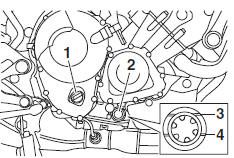
- Engine oil filler cap
- Engine oil level check window
- Maximum level mark
- Minimum level mark
4. If the engine oil is below the minimum level mark, add sufficient oil of the recommended type to raise it to the correct level.
To change the engine oil (with or without oil filter cartridge replacement)
1. Place the vehicle on a level surface.
2. Start the engine, warm it up for several minutes, and then turn it off.
3. Place an oil pan under the engine to collect the used oil.
4. Remove the engine oil filler cap, the engine oil drain bolt and its gasket to drain the oil from the crankcase.
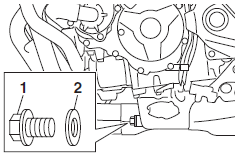
- Engine oil drain bolt
- Gasket
TIP
Skip steps 5-7 if the oil filter cartridge is not being replaced.
5. Remove the oil filter cartridge with an oil filter wrench.
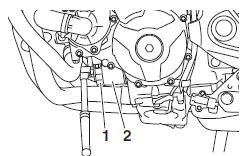
- Oil filter wrench
- Oil filter cartridge
TIP
An oil filter wrench is available at a Yamaha dealer.
6. Apply a thin coat of clean engine oil to the O-ring of the new oil filter cartridge.
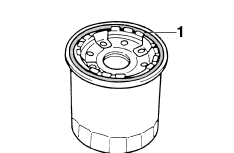
- O-ring
TIP
Make sure that the O-ring is properly seated.
7. Install the new oil filter cartridge with an oil filter wrench, and then tighten it to the specified torque with a torque wrench.
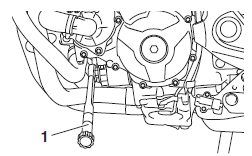
- Torque wrench
Tightening torque:
Oil filter cartridge:
17 Nm (1.7 m*kgf, 12 ft*lbf)
8. Install the engine oil drain bolt and its new gasket, and then tighten the bolt to the specified torque.
Tightening torque:
Engine oil drain bolt:
43 Nm (4.3 m*kgf, 31 ft*lbf)
9. Refill with the specified amount of the recommended engine oil, and then install and tighten the oil filler cap.
Recommended engine oil:
See page 8-1.
Oil quantity:
Oil change:
2.40 L (2.54 US qt, 2.11 Imp.qt)
With oil filter removal:
2.70 L (2.85 US qt, 2.38 Imp.qt)
TIP
Be sure to wipe off spilled oil on any parts after the engine and exhaust system have cooled down.
NOTICE
- In order to prevent clutch slippage (since the engine oil also lubricates the clutch), do not mix any chemical additives. Do not use oils with a diesel specification of "CD" or oils of a higher quality than specified. In addition, do not use oils labeled "ENERGY CONSERVING II" or higher.
- Make sure that no foreign material enters the crankcase.
10. Start the engine, and then let it idle for several minutes while checking it for oil leakage. If oil is leaking, immediately turn the engine off and check for the cause.
TIP
After the engine is started, the engine oil level warning light should go off if the oil level is sufficient.
NOTICE
If the oil level warning light flickers or remains on even if the oil level is correct, immediately turn the engine off and have a Yamaha dealer check the vehicle.
11. Turn the engine off, wait a few minutes until the oil settles, and then check the oil level and correct it if necessary.
Coolant
The coolant level should be checked before each ride. In addition, the coolant must be changed at the intervals specified in the periodic maintenance and lubrication chart.
To check the coolant level
1. Place the vehicle on the centerstand.
TIP
- The coolant level must be checked on a cold engine since the level varies with engine temperature.
- Make sure that the vehicle is positioned straight up when checking the coolant level. A slight tilt to the side can result in a false reading.
2. Check the coolant level in the coolant reservoir.
TIP
The coolant should be between the minimum and maximum level marks.
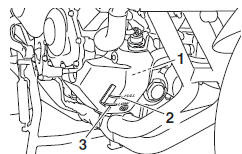
- Coolant reservoir
- Maximum level mark
- Minimum level mark
3. If the coolant is at or below the mi- 6 nimum level mark, remove the coolant reservoir cap.
WARNING! Remove only the coolant reservoir cap. Never attempt to remove the radiator cap when the engine is hot. [
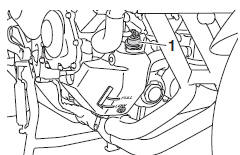
- Coolant reservoir cap
4. Add coolant or distilled water to raise the coolant to the maximum level mark, install the coolant reservoir cap.
NOTICE: If coolant is not available, use distilled water or soft tap water instead. Do not use hard water or salt water since it is harmful to the engine.
If water has been used instead of coolant, replace it with coolant as soon as possible, otherwise the cooling system will not be protected against frost and corrosion. If water has been added to the coolant, have a Yamaha dealer check the antifreeze content of the coolant as soon as possible, otherwise the effectiveness of the coolant will be reduced.
Coolant reservoir capacity (up to the maximum level mark): 0.25 L (0.26 US qt, 0.22 Imp.qt)
To change the coolant
1. Place the vehicle on the centerstand.
2. Remove panel A.
3. Place a container under the engine to collect the used coolant.
4. Remove the radiator cap retaining bolt, radiator cap retainer and radiator cap.
WARNING! Never attempt to remove the radiator cap when the engine is hot.
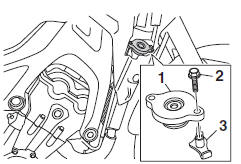
- Radiator cap
- Radiator cap retaining bolt
- Radiator cap retainer
5. Remove the coolant reservoir cover and coolant reservoir by removing the bolts and collars.
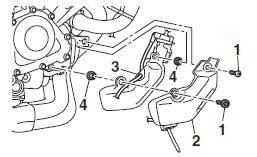
- Bolt
- Coolant reservoir cover
- Coolant reservoir
- Collar
6. Remove the coolant reservoir cap.
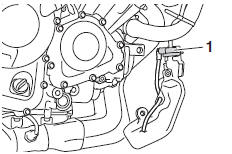
- Coolant reservoir cap
7. Drain the coolant from the coolant reservoir by turning it upside down.
8. Install the coolant reservoir and its cover by placing them in the original position, and then installing the collars and bolts.
9. Remove the coolant drain bolt and its gasket to drain the cooling system.
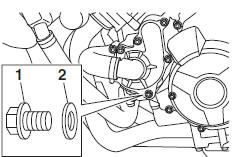
- Coolant drain bolt
- Gasket
10. After the coolant is completely drained, thoroughly flush the cooling system with clean tap water.
11. Install the coolant drain bolt and its new gasket, and then tighten the bolt to the specified torque.
Tightening torque:
Coolant drain bolt:
10 Nm (1.0 m*kgf, 7.2 ft*lbf)
12. Pour the specified amount of the recommended coolant into the radiator and reservoir.
Antifreeze/water mixture ratio: 1:1 Recommended antifreeze: High-quality ethylene glycol antifreeze containing corrosion inhibitors for aluminum engines Coolant quantity: Radiator (including all routes): 1.93 L (2.04 US qt, 1.70 Imp.qt) Coolant reservoir (up to the maximum level mark): 0.25 L (0.26 US qt, 0.22 Imp.qt)
13. Install the coolant reservoir cap.
14. Install the radiator cap.
15. Start the engine, let it idle for several minutes, and then turn it off.
16. Remove the radiator cap to check the coolant level in the radiator. If necessary, add sufficient coolant until it reaches the top of the radiator, and then install the radiator cap, radiator cap retainer and radiator cap retaining bolt.
17. Check the coolant level in the reservoir.
If necessary, remove the coolant reservoir cap, add coolant to the maximum level mark, and then install the cap.
18. Start the engine, and then check the vehicle for coolant leakage. If coolant is leaking, have a Yamaha dealer check the cooling system.
19. Turn off the engine, and then install the panel.
See also:
 Yamaha Tracer MT09TRA - Owner's Manual > Removing and installing the panel
Yamaha Tracer MT09TRA - Owner's Manual > Removing and installing the panel
The panel shown needs to be removed to perform some of the maintenance jobs described in this chapter. Refer to this section each time the panel needs to be removed and installed. Panel A
 Yamaha Tracer MT09TRA - Owner's Manual > Air filter element
Yamaha Tracer MT09TRA - Owner's Manual > Air filter element
The air filter element must be replaced at the intervals specified in the periodic maintenance and lubrication chart. Have a Yamaha dealer replace the air filter element. Checking the engine idling speed

 BMW G310GS
BMW G310GS Honda CBR125RW
Honda CBR125RW Husqvarna 401 Vitpilen
Husqvarna 401 Vitpilen KTM 890 Duke R
KTM 890 Duke R Mash Dirt Track 650
Mash Dirt Track 650 Peugeot Kisbee
Peugeot Kisbee Yamaha Tracer MT-09
Yamaha Tracer MT-09 Honda CBR125RW
Honda CBR125RW Peugeot Kisbee
Peugeot Kisbee Yamaha Tracer MT-09
Yamaha Tracer MT-09